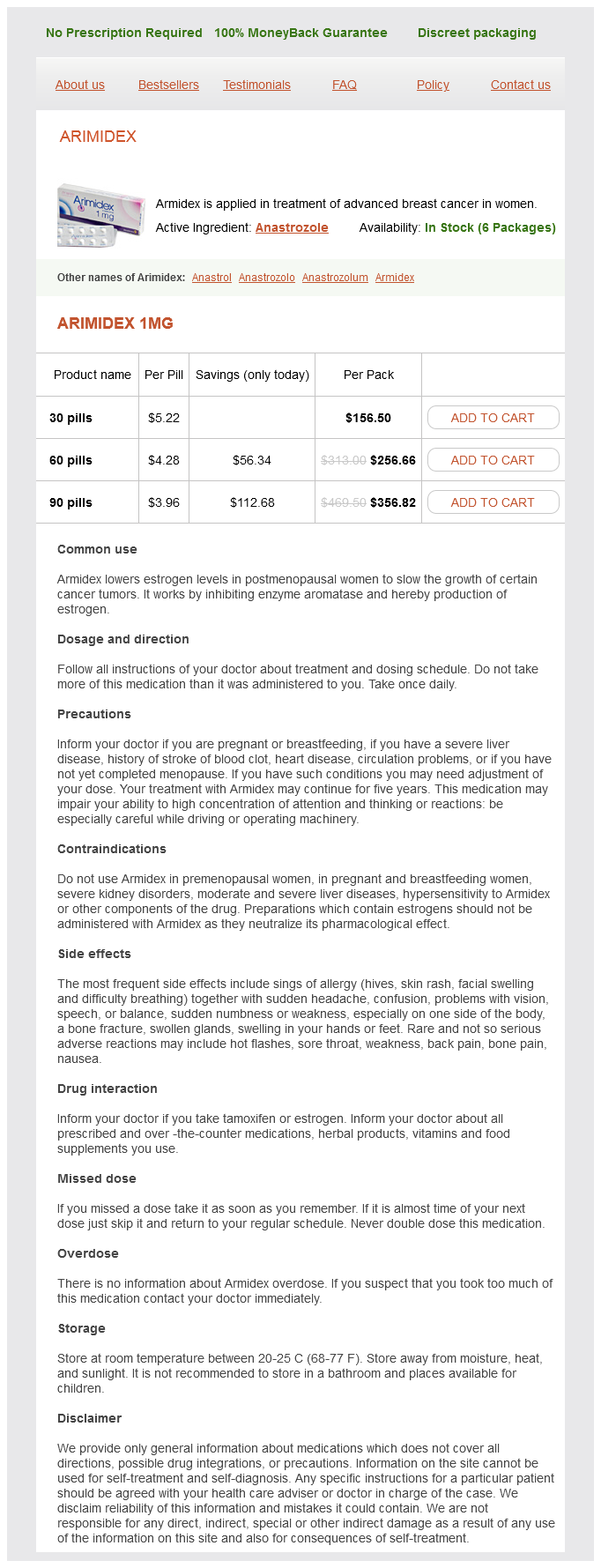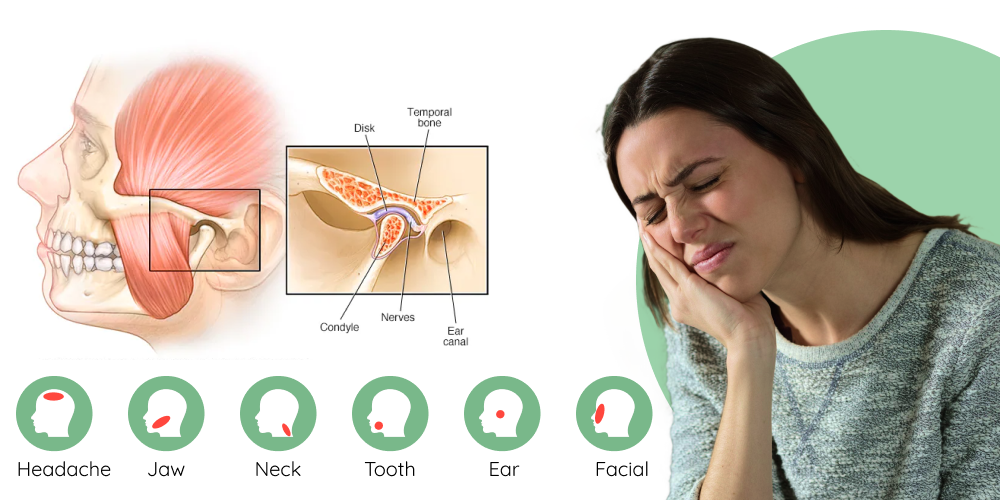Arimidex
Arimidex
Arimidex dosages: 1 mg
Arimidex packs: 30 pills, 60 pills, 90 pills
In stock: 717
Only $4.21 per item
Description
Some experts believe that number of people diagnosed with anorexia represents only the most severe cases menstruation at age 8 1 mg arimidex purchase free shipping, and that many more people have anorexic tendencies, but their symptoms do not rise to the level needed for a medical diagnosis. Most people diagnosed with anorexia are white, and about three-quarters come from households at the middle income level or above. However, the number of blacks and Hispanics diagnosed with anorexia has increased. Competitive athletes of all races have an increased risk of developing anorexia nervosa, especially in sports where weight is tied to performance. Jockeys, wrestlers, figure skaters, cross-country runners, and gymnasts (especially female gymnasts) have higher than average rates of anorexia. People such as actors, models, cheerleaders, and dancers (especially ballet dancers) who are judged mainly on their appearance are also at high risk of developing the disorder. The younger the age at which anorexic behavior starts, the more difficult it is to cure. Preteens who develop anorexia often show signs of compulsive behavior and depression in addition to anorexia. Research suggests that some people have a predisposition toward anorexia and that something triggers the behavior, which then becomes selfreinforcing. Overlaying the family situation is the unrelenting media message that thin is 'good' and fat is 'bad. Twin studies show that if one twin has anorexia nervosa, the other has a greater likelihood of developing the disorder. Having a close relative, usually a mother or a sister, with anorexia nervosa also increases the likelihood of other (usually female) family members developing the disorder. However, when compared to many other diseases, the inherited component of anorexia nervosa appears to be fairly small. There is some evidence that anorexia nervosa is linked to abnormal neurotransmitter activity in the part of the brain that controls pleasure and appetite. Some researchers believe that this is related to the fact that the stomach of people with anorexia tends to empty more slowly than normal; others think it may be related to the appetite control mechanism of the brain. Certain personality types appear to be more vulnerable to developing anorexia nervosa. People with anorexia tend to be perfectionists who have unrealistic expectations about how they 'should' look and perform. They tend to have a black-and-white, right-or-wrong, all-or-nothing way of seeing situations. Many people with anorexia lack a strong sense of identity and instead take their identity from pleasing others. Many experience depression and anxiety disorders, although researchers do not know if this is a cause or a result of the eating disorder. People with anorexia are more likely to come either from overprotective families or disordered families where there is a lot of conflict and inconsistency.
Mother of Rye (Ergot). Arimidex.
- Are there any interactions with medications?
- Are there safety concerns?
- Dosing considerations for Ergot.
- How does Ergot work?
- Reducing bleeding in childbirth, assisting delivery, menstrual pain, and other conditions.
- What is Ergot?
Source: http://www.rxlist.com/script/main/art.asp?articlekey=96442
Bariatric surgery is performed only on people whose risk of complications from surgery is outweighed by the need to lose weight to prevent health complications and for whom supervised weight-loss and exercise programs have repeatedly failed women's health questionnaire (whq) pdf 1 mg arimidex buy amex. Heartburn-A pain in the center of the chest behind the breastbone caused by the contents of the stomach backflowing (refluxing) into the lower end of the esophagus and causing irritation. Morbidly obese-Defines a person who is 100 lb (45 kg) (or more than 50%) overweight and has a body mass index above 40. Osteoporosis-A condition found in older individuals in which bones decrease in density and become fragile and more likely to break. Sleep apnea-A sleep disorder in which breathing stops briefly then resumes on its own. Type 2 diabetes-Sometimes called adult-onset diabetes, a disease that prevents the body from properly using glucose (sugar) but can often be controlled with diet and exercise. Pre-surgery counseling is required to help patients anticipate what to expect after the operation. Aftercare Immediately after the operation, most patients are restricted to a liquid diet for 23 weeks; however, some may remain on it for up to 12 weeks. Patients then move on to a diet of pureed food for about a month, and after about two months most can tolerate solid food. Restrictive surgeries pose few special nutritional concerns, but malabsorptive surgeries require both a specialized diet for several months after surgery and a lifelong commitment to taking nutritional supplements. Individuals having bariatric surgery receive both psychological and nutritional counseling before and after surgery. Once individuals begin eating, they follow a schedule similar to the one below: Preparation After patients are carefully selected as appropriate for obesity surgery, they receive standard preoperative 634 Liquids such as juice, broth, milk, or diluted cooked cereal for two or three days. Soft foods such as ground meat and soft-cooked fruits and vegetables for about eight weeks. Lifelong nutritional supplementation the stomach pouch in restrictive surgeries tends to stretch, allowing people to eat more and still feel comfortable. On the positive side, people who lose weight through surgery almost always see great improvement in any obesity-related diseases they have. Pregnancy, although possible, also presents some special nutritional risks to women who have had weight loss surgery. When deciding whether to have a surgical weightloss procedure, the expected benefits must outweigh the risks of continued obesity. Most iron and calcium is absorbed in the duodenum, the first part of the intestine that is bypassed by these operations. Calcium deficiency can lead to osteoporosis, and iron deficiency can cause anemia.
Specifications/Details
Common phobias include agoraphobia (fear of open spaces) menopause itchy skin discount 1 mg arimidex free shipping, claustrophobia (fear of small or confined spaces), and social phobia. People frequently report feelings of high anxiety when they anticipate and, therefore, fear the loss of social approval or love. Social phobia is a specific anxiety disorder that is marked by high levels of anxiety or fear of embarrassment in social situations. People who belong to groups that are targets of bias are at higher risk for developing anxiety disorders. Some experts think, for example, that the higher rates panic disorder among women reflects their greater social and economic vulnerability. Some controversial studies indicate that the increase in violent or upsetting pictures and stories in news reports and entertainment may raise the anxiety level of many people. Stress and anxiety management programs often suggest that patients cut down their exposure to upsetting stimuli. People who must live or work around sudden or loud noises, bright or flashing lights, chemical vapors, or similar nuisances, which they cannot avoid or control, may develop heightened anxiety levels. Another factor that shapes human experiences of anxiety is knowledge of personal mortality. Some researchers think that awareness of death influences experiences of anxiety from the time that a person is old enough to understand death. These symptoms are produced by the hormonal, muscular, and cardiovascular reactions involved in the fight-or-flight reaction. Children and adolescents with generalized anxiety disorder show a high percentage of physical complaints. Behavioral symptoms of anxiety include pacing, trembling, general restlessness, hyperventilation, pressured speech, hand wringing, and finger tapping. Cognitive symptoms of anxiety include recurrent or obsessive thoughts, feelings of doom, morbid or fear-inducing thoughts or ideas, and confusion, or inability to concentrate. Feeling states associated with anxiety include tension or nervousness, feeling 'hyper' or 'keyed up,' and feelings of unreality, panic, or terror. When anxiety is untreated, the individual may use, consciously or unconsciously, a number of coping strategies. The person justifies the anxious feelings by saying that any normal person would feel anxious in this situation. The anxiety emerges in the form of physical complaints and illnesses, such as recurrent headaches, stomach upsets, or muscle and joint pain. The person converts anxious feelings into conspiracy theories or similar ideas without reality testing. Some instances of alcohol or drug use, abuse, or addiction may stem from attempts to self-medicate for anxiety.
Syndromes
- Electrocardiogram
- Surgery
- Skin color changes around the ankles
- Shock
- Diuretics (water pills)
- Persistent diarrhea
- Skin rash
- 12 to 15 months
Related Products
Additional information:
Usage: q.h.
Tags: generic 1 mg arimidex with mastercard, cheap arimidex 1 mg fast delivery, arimidex 1 mg order on line, discount 1 mg arimidex otc
9 of 10
Votes: 28 votes
Total customer reviews: 28
Customer Reviews
Rakus, 50 years: Julia Barrett Basal cell cancer see Skin cancer Description Basal keratinocytes are unpigmented skin cells found deep in the epidermis, hair follicles, and sweat glands.
Abe, 24 years: It is possible that the increased use of multimedia rather than traditional dissection in anatomy courses will lead to an eventual decline in the number of positions for anatomy instructors.
Seruk, 58 years: Anyone who has unusual symptoms after taking this medicine should get in touch with his or her physician.
Pyran, 43 years: Risk factors in children include the following: low birth weight being born during a high-pollen season not being breastfed exposure to tobacco smoke exposure to pets lack of exposure to germs and other antigens in early life is increasing childhood allergies.
Marius, 56 years: Older patients with other medical conditions or who are taking many different drugs also may need smaller or less frequent doses.
-
Our Address
-
For Appointment
Mob.: +91-9810648331
Mob.: +91-9810647331
Landline: 011 45047331
Landline: 011 45647331
info@clinicviva.in -
Opening Hours
-
Get Direction








